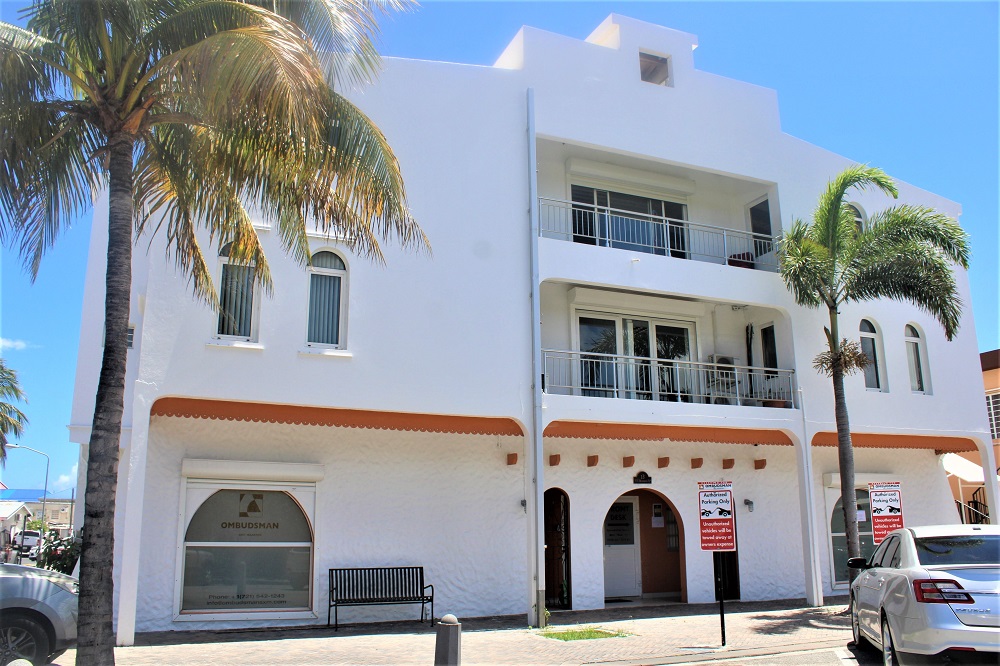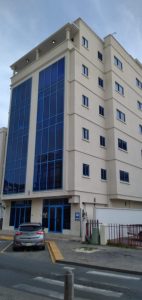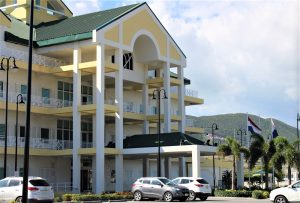Office space mini audit leaves many questions unanswered

PHILIPSBURG — The General Audit Chamber submitted its mini audit “Efficiency of government’s office space” to Parliament on Tuesday, March 30 with a rather embarrassing conclusion: the auditors were unable to analyze whether the current use of office space is effective.
Facility Affairs, a department of the Ministry of General Affairs, is responsible for managing the government’s office space, but an office space policy is still a work in progress. According to the Secretary-General of the Ministry of General Affairs, this policy will include the number of staff per department and per location. “It is unclear why the government chooses to rent in certain instances and whether leasing or renting is more beneficial than owning,” the Audit Chamber writes in its report.
From an overview presented in the report, it appears that the government owns 52 buildings and that it rents another 40 to accommodate its departments.
 The listing of buildings the auditors received is “possibly not complete.” The BTP-building is for instance not listed, while Facility Affairs stated to the auditors that the government owns it. The 2020 budget contained a provision of 8 million guilders for the acquisition of the building.
The listing of buildings the auditors received is “possibly not complete.” The BTP-building is for instance not listed, while Facility Affairs stated to the auditors that the government owns it. The 2020 budget contained a provision of 8 million guilders for the acquisition of the building.
The auditors found another discrepancy closer to home: the list Facility Affairs provided mentions the annual rent for the building of the General Audit Chamber as 16,594 guilders ($9,270) per year. In reality, the rent is 9,000 guilders per month and therefore 108,000 guilders ($60,335) per year.
The Ministries of Finance and General Affairs are now working out a service level agreement that must ensure that the Finance Ministry delivers an accurate and standardized database upon request to Facility Affairs.
The auditors also searched for reasons why the government rents or leases property to house a large part of its organization, but they found no answers. “Information to make a comparative calculation of rental versus owned property was “not available or not properly maintained.”
“The question whether the government gets value for money from rental office space remains unanswered,” the report states.
It is also unclear whether the government is still paying rent for buildings that were damaged during Hurricane Irma. “No adequate central records are currently maintained by Facility Affairs for a variety of reasons,” the Ministry of General Affairs informed the auditors, without clarifying the reasons it referred to.
 On February 7, 2016, Social and Health Insurances SZV signed an agreement with the government to buy the government building on Soualiga Boulevard for 45 million guilders ($25.1 million). Richard Gibson Sr., the Minister of Finance at the time of the deal, stated in a government-issued press release that occupying the building would save 300 to 400 thousand guilders in rental expenditures per year.
On February 7, 2016, Social and Health Insurances SZV signed an agreement with the government to buy the government building on Soualiga Boulevard for 45 million guilders ($25.1 million). Richard Gibson Sr., the Minister of Finance at the time of the deal, stated in a government-issued press release that occupying the building would save 300 to 400 thousand guilders in rental expenditures per year.
According to the report from the Audit Chamber, those savings did not materialize. In 2016 the government spent 14,634,000 on rent and in 2018 it shot up to 17,821,000 – an increase of 3,187,000 guilders or more than 21.7 percent. Part of this increase can be explained from the need to rent additional office space after several offices were damaged or destroyed during Hurricane Irma in 2017.
In 2020 rental expenditures decreased by 1.1 million guilders (almost 6.3 percent) to 16,700,000 guilders – still way above the 2016 level.


























